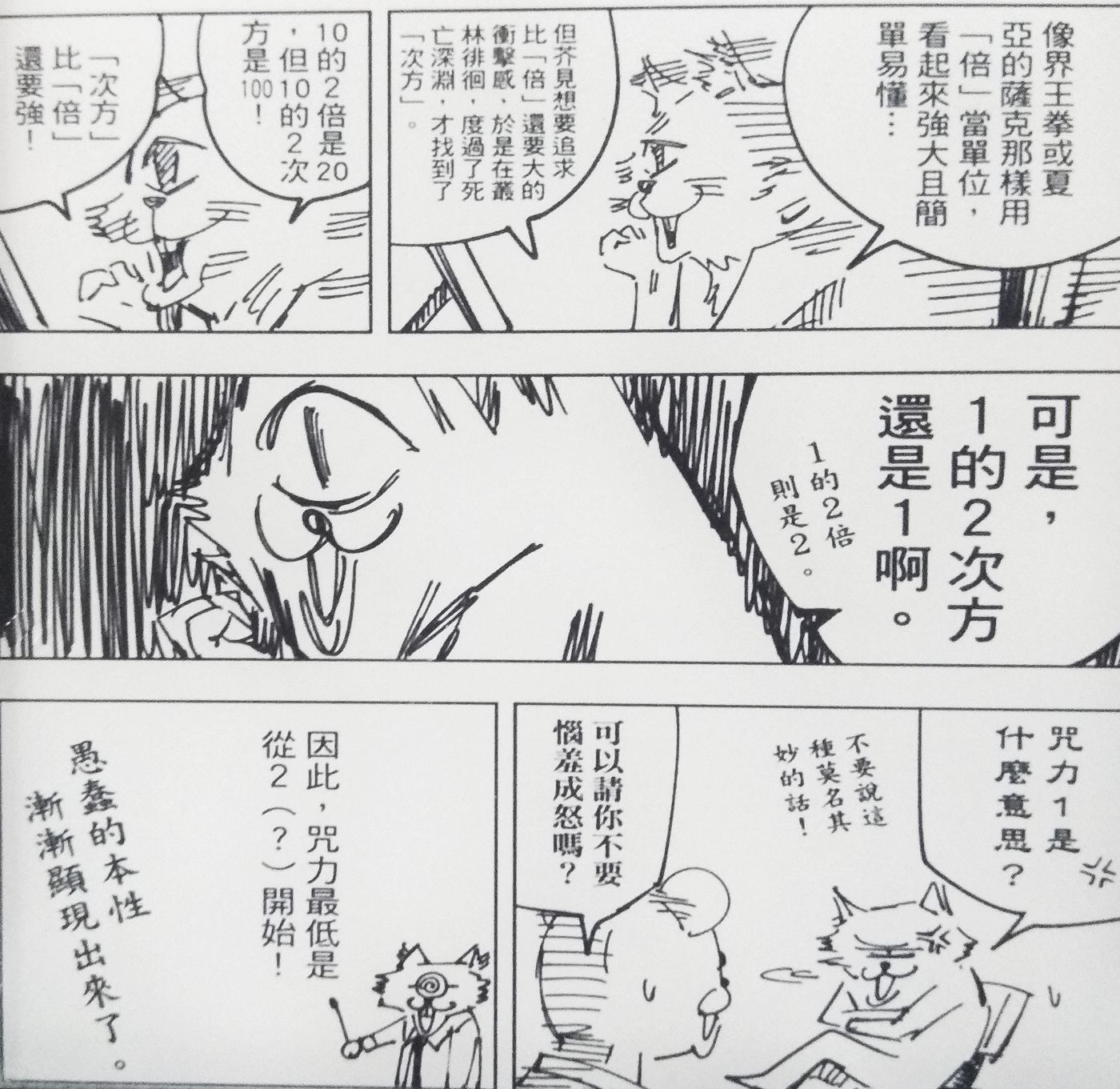
有時沉默,有時健談。 閱讀/翻譯/思考/好奇寶寶/有點宅
"The lowest magic power starts from 2" in "Curse Back to War" & the ancient Greek concept of numbers

This is a student of the text group, but he has to use a lot of mathematical principles in the comics. For this reason, the author of "Curse Back to War", who often feels stomach pain, must see the following, in the single book, he uses the trick "Black Flash" that the magician uses in his peak state. ", provides a definition:
In order to emphasize that Black Flash is stronger than normal magic attacks, the power value is set to "power".
But this proposal was complained by the assistant: "But the power of 1 is still 1?"
So must see had to continue to break and say: "So the mantra is counted from '2'."
Sounds super casual and insane.
However, this string of bluffs can really find a more blunt basis! www
Because, I accidentally learned a very paradoxical thing recently:
The smallest number in ancient Greece was not "1", but "2"! .
At first I saw scholars who interpret ancient Greek texts mentioning this, and I was very confused: what is called Greek mathematics without 1? ? ? Minimum number to start with 2? ? ? How do you usually count?
After careful investigation, I found out that the numbers of the ancient Greek mathematical principles are a bit different from the numbers used in arithmetic.
Counting items in daily life, of course, there will be 1, 2, 3, 4, and 5. A cow, a flower, a chicken, a day, etc. This is the number used at the arithmetic level.
But when it comes to the definition of number itself, there is really no "1"!
Because what they think of as "numbers" is not the same as contemporary numbers that add up to the sum. Rather, it is a relational unit (unit, monas)* that is closer to "group/group".
*This word is important and will be explained below.
That is to say, numbers are not exactly hypothetical concepts to be filled with matter, but surprisingly have quite concrete independent existence.
This may be because ancient Greek discussions of mathematics used cobblestones in the fifth century BC. (So specific! …)
It was not until about the third century BC that the drawing of equidistant straight lines was used to illustrate.
(Have you run out of pebbles? www)
Therefore, the definition of this number is more like "a dozen" in "a dozen teacups = 12 teacups".
Among them, the "2" cups are "2" and belong to the "2" of a dozen "12".
But it doesn't disappear because of this affiliation. "2" makes up "12", but it is still "2", and the attribute does not change because it belongs to "12".
Therefore, since "number" is a relational concept of "group/group", of course, a single teacup cannot be grouped or grouped (not relational), and it must start from "2".
So the sequence must also start counting from 2: 2, 3, 4, 5... .
However, what is the position of "1" in the number?
It is "the beginning of numbers".
A comparison is like a starting point that must exist in a number structure. But not numbers ! 😂
Remember the word "unit" mentioned above? The Greek word is monas, which means alone. Usually used to refer to the smallest indivisible unit that makes up matter, and is sometimes translated as an atom (not the chemical one) or a monad.
According to the mathematician and master (no joke) Pythagoras, the monas were the beginning of existence, the point of birth. Numerous numbers are born from monas. Numbers create points, points create lines, lines create surfaces, and then form all three-dimensional shapes. Since a number is something out of "single monas", of course it is no longer "single", the sequence must start with "2".
But isn't the beginning and the later connected together? It may be a little difficult for modern people to understand why the ancient Greeks set a beginning, but it doesn't belong in the numbers that follow.
However, from a metaphysical point of view, it has its logical necessity.
Aristotle, for example, believed that everything has a cause, but pushing it upwards in this way will cause infinite regress. Therefore, it is necessary to set a source that causes all things, but it cannot fall into this chain of cause and effect, so as not to deduce it again and again, endlessly.
By the way, although this general source of all functions and creation was later borrowed as God by medieval theology, this was not Aristotle’s original intention, so I won’t go into details here.
Same logic, I think that's why "1" is considered a beginning but not a "number". Otherwise, the sequence will also regress infinitely.
Of course, contemporary mathematics is more inclined than ancient Greek mathematics to purely operational units rather than to the concrete existence of metaphysical formulas.
Therefore, the infinite retreat is not a problem that needs to be avoided, and of course we will feel embarrassed.
Therefore, if the mana value that Musta sees is talking about is regarded as an ancient Greek number, it is really necessary to start with "2" than that!
At such a time, it was time to correspond to Gojo Satoru's "Unlimited" spell that applied Zeno's paradox. Both products of ancient Greek civilization, unexpectedly, can really produce consistency.

I don't know if Mustajian knew it earlier and pretended not to know, or if he really fooled him, but okay! Let it start counting from "2" with the lowest spell power! www
(No, don't speak for him! www)
Like my work?
Don't forget to support or like, so I know you are with me..
Comment…